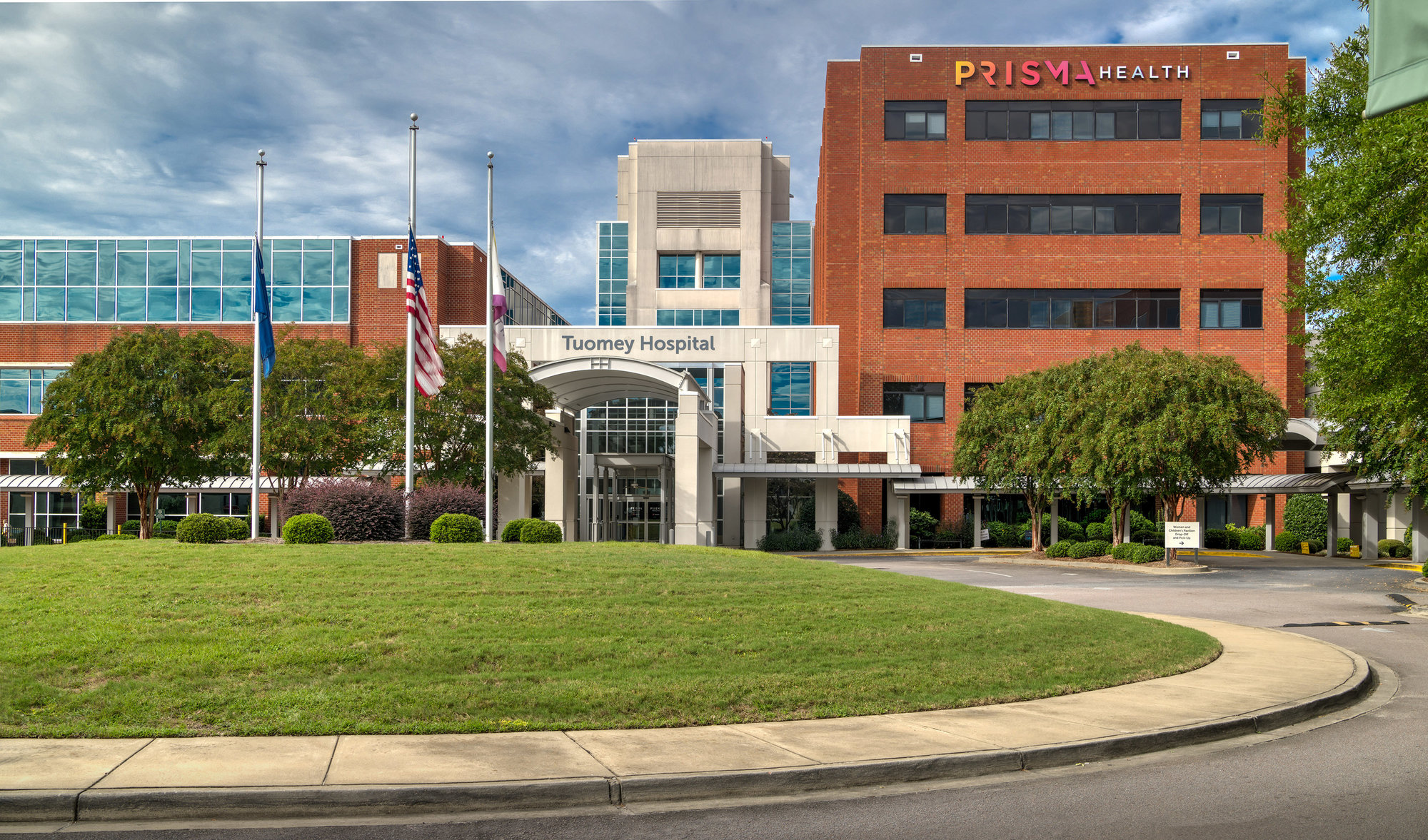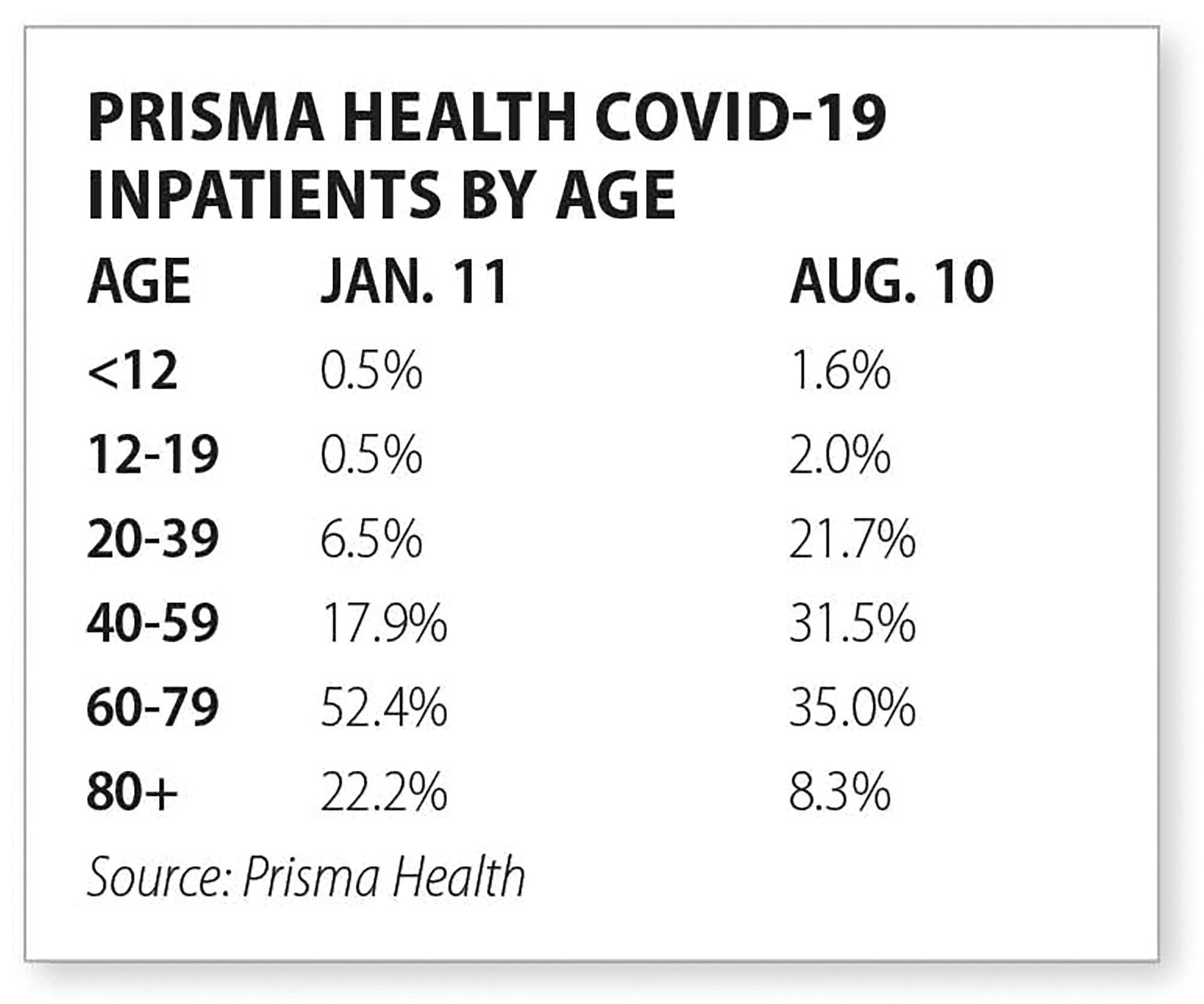Prisma doctors: Hospital beds are filling with younger, unvaccinated patients; infectious disease expert urges pregnant women get shots to protect babies
On Aug. 12: 304
% not vaccinated: 88.4%
July 2020: 321
January 2021: 546
July 2: 12
Aug. 2: 142
Aug. 9: 252
Source: Prisma Health
kayla@theitem.com
Prisma Health hospitals, which include Sumter's Tuomey Hospital, are strained once again by a surge in hospitalized COVID-19 patients. The difference in this third wave is those getting the sickest are younger, and most are unvaccinated.
"This is not the same surge we had last summer," said Steve Shelton, COVID-19 incident commander for Prisma Health in the Midlands and an emergency room physician, as he called during a media briefing Thursday for the "community to step up" by getting vaccinated.
On Aug. 12, Prisma Health was caring for 304 COVID-19 patients across its system, which spans the Midlands and Upstate, and 88.4% of them were not vaccinated against the virus. That is less than the peak of 546 that was recorded in January but more than one month ago when the COVID-19 hospital inpatient count systemwide was 12.
Shelton said the 8.5% of those hospitalized who have been fully vaccinated are mostly over the age of 60 and in already frail health conditions. The remaining 3.1% hospitalized have been partially vaccinated.
He said the strain on the system is increasing wait times, necessitating patients and equipment be transferred where there is need and space (an ability the system promotes), and further taking a mental and physical toll on nurses and health care workers who have been caring for COVID-19 patients for 17 months now.
Those health care workers are caring for a different demographic of patients now, too.
According to Prisma data, there has been an increase in the percentage of patients aged 0-59 needing a hospital bed, while the percentage of inpatients who are 60 and older has decreased.
The data compared Prisma's hospitalized COVID-19 patients on Jan. 11 and Aug. 10. While patients aged 20-39 made up 6.5% of the system's inpatients in January, the age range accounted for 21.7% of its patients in August. For those aged 40-59, the numbers jumped from 17.9% in January to 31.5% in August.
Meanwhile, while 52.4% of the system's COVID-19 patients on Jan. 11 were aged 60-79, on Aug. 10, the age range accounted for 35% of patients. For those aged 80 and older, the numbers shrank from 22.2% to 8.3%.
Helmut Albrecht, medical director of the Center for Infectious Disease Research and Policy for Prisma Health and the University of South Carolina, said that while people are focusing on "rare" breakthrough cases - when a vaccinated person gets the virus - "what's really concerning" is the low rate of vaccinations in South Carolina.
He pleaded for those who can get vaccinated to do so "to build a wall" around those who cannot defend themselves against the virus, such as children under the age of 12, because the FDA has not authorized the vaccine for them yet, or people with cancer and going through chemotherapy, because the medicine makes vaccines less effective.
"This is the best studied vaccine we've ever had, it's one of the most effective vaccines and probably hands down the best tolerated one," Albrecht said. "I understand there are individuals who struggled with the vaccine, but there are also 600,000-plus dead from COVID-19."
He cited new CDC guidance that more strongly encourages pregnant women to get vaccinated. They not just can, the guidance says, but they should.
"COVID-19 is bad for pregnant women and their babies. It's clear now that the vaccine doesn't harm Mom or the baby or prospects of getting pregnant," he said.
His testimony is his twin grandsons. He said his daughter-in-law got her vaccine when she was 13 weeks pregnant. Her sons are now a month old.
"They're healthy, and I credit the vaccines," said Albrecht as he went on to say that because they're too young to get the shot themselves, the antibodies passed from Mom to sons through placenta and breastmilk is the "best and only way to protect them."
More Articles to Read




